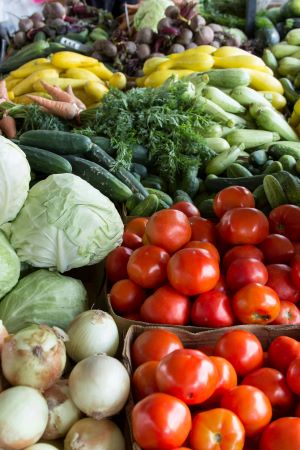
Veggies - What's in it for me?
Les CalvertA - Z of Vegetables
A Comprehensive Guide to the Nutrients and Benefits of Eating Vegetables
Vegetables are essential components of a healthy diet, providing a wide range of nutrients necessary for overall well-being. They are packed with vitamins, minerals, antioxidants, and fibre, which help prevent chronic diseases, improve digestion, and promote optimal health. This guide covers the key nutrients and health benefits of major vegetables, highlighting their roles in supporting various bodily functions.
1. Leafy Greens (Spinach, Kale, Swiss Chard, Collard Greens)- Nutrients: Rich in vitamins A, C, K, and folate, as well as minerals like iron, calcium, and magnesium. They are also high in antioxidants like lutein and zeaxanthin.
- Bone Health: Vitamin K in leafy greens plays a crucial role in bone metabolism and helps prevent osteoporosis.
- Eye Health: Lutein and zeaxanthin are antioxidants that protect the eyes from age-related macular degeneration and cataracts.
- Heart Health: The high fibre content and antioxidants help lower cholesterol levels and reduce the risk of heart disease.
- Nutrients: High in vitamins C, K, and folate, as well as fibre and various phytochemicals like glucosinolates.
- Cancer Prevention: Glucosinolates are compounds that may help protect against certain types of cancer by inhibiting the growth of cancer cells.
- Detoxification: Cruciferous vegetables support liver detoxification processes, helping the body eliminate harmful toxins.
- Heart Health: These vegetables help lower cholesterol levels and reduce inflammation, which are key factors in heart disease prevention.
- Nutrients: High in vitamins A and C, potassium, fibre, and antioxidants like beta-carotene.
- Vision Health: Beta-carotene in carrots and sweet potatoes is converted to vitamin A, essential for maintaining healthy vision and preventing night blindness.
- Immune Support: Vitamin C and other antioxidants boost the immune system by protecting cells from damage caused by free radicals.
- Digestive Health: The fibre in root vegetables promotes healthy digestion by supporting regular bowel movements and feeding beneficial gut bacteria.
- Nutrients: Rich in sulfur compounds, vitamins C and B6, manganese, and selenium.
- Heart Health: Garlic and onions help lower blood pressure, reduce cholesterol levels, and improve circulation, which are all beneficial for heart health.
- Immune Support: The sulfur compounds in allium vegetables have antimicrobial properties that boost the immune system and protect against infections.
- Anti-Inflammatory: These vegetables contain anti-inflammatory compounds that help reduce inflammation and lower the risk of chronic diseases like arthritis.
- Nutrients: High in vitamins C and A, potassium, and antioxidants like lycopene and anthocyanins.
- Heart Health: Lycopene, particularly abundant in tomatoes, helps reduce the risk of heart disease by lowering cholesterol levels and protecting against oxidative stress.
- Skin Health: The antioxidants in nightshades help protect the skin from sun damage and promote collagen production, leading to healthier skin.
- Eye Health: Vitamin A in nightshade vegetables supports good vision and helps prevent age-related eye conditions.
- Nutrients: Rich in plant-based protein, fibre, folate, iron, and potassium.
- Digestive Health: The high fibre content in legumes promotes a healthy digestive system by supporting regular bowel movements and feeding beneficial gut bacteria.
- Heart Health: Legumes help lower cholesterol levels and regulate blood sugar, reducing the risk of heart disease and type 2 diabetes.
- Muscle and Tissue Health: The protein in legumes is essential for muscle repair and growth, making them a key food for vegetarians and vegans.
- Nutrients: High in vitamins A and C, potassium, and fibre, as well as antioxidants like beta-carotene.
- Vision Health: Beta-carotene in squash and pumpkins supports healthy vision and reduces the risk of age-related eye diseases.
- Immune Support: Vitamin C boosts immune function, helping the body resist infections and illnesses.
- Heart Health: The potassium in these vegetables helps regulate blood pressure and supports overall cardiovascular health.
- Nutrients: High in vitamins C and K, potassium, and water content, with a good amount of fibre.
- Hydration: The high water content in cucumbers and zucchini helps keep the body hydrated, which is essential for overall health.
- Skin Health: Vitamin C in gourds promotes collagen production, which is vital for maintaining healthy skin.
- Weight Management: These low-calorie, high-fibre vegetables help with weight management by promoting satiety and reducing overall calorie intake.
- Nutrients: Rich in B vitamins (especially niacin, riboflavin, and pantothenic acid), selenium, copper, and vitamin D (when exposed to sunlight).
- Immune Support: Mushrooms contain beta-glucans, which help boost the immune system and protect against infections.
- Brain Health: The B vitamins in mushrooms support brain function, energy production, and the nervous system.
- Antioxidant Protection: Selenium in mushrooms acts as an antioxidant, protecting cells from damage and supporting thyroid function.
- Nutrients: High in carbohydrates, vitamins C and B6, potassium, and fibre.
- Energy Source: Tubers are an excellent source of complex carbohydrates, providing sustained energy for the body.
- Digestive Health: The fibre in tubers promotes healthy digestion and prevents constipation.
- Heart Health: Potassium in tubers helps regulate blood pressure, reducing the risk of heart disease.
- Nutrients: High in vitamin C, potassium, fibre, and glucosinolates.
- Digestive Health: The fibre in brassica vegetables promotes regular bowel movements and supports a healthy gut.
- Cancer Prevention: Glucosinolates in these vegetables have been shown to inhibit the growth of cancer cells.
- Heart Health: The combination of potassium, fibre, and antioxidants helps lower blood pressure and reduce the risk of heart disease.
- Nutrients: Rich in iodine, calcium, magnesium, and various vitamins and minerals, including B vitamins and vitamin K.
- Thyroid Health: Iodine in sea vegetables is essential for thyroid function, which regulates metabolism and energy production.
- Bone Health: Calcium and magnesium in sea vegetables support bone health and prevent osteoporosis.
- Detoxification: Sea vegetables contain alginates, which help remove heavy metals and toxins from the body.
Eating a variety of vegetables ensures you receive a wide range of essential nutrients that support overall health and well-being. Each vegetable offers unique benefits, from supporting heart health and digestion to promoting healthy skin and eyes. By incorporating more vegetables into your diet, you can improve your nutritional intake, boost your immune system, and reduce the risk of chronic diseases.

